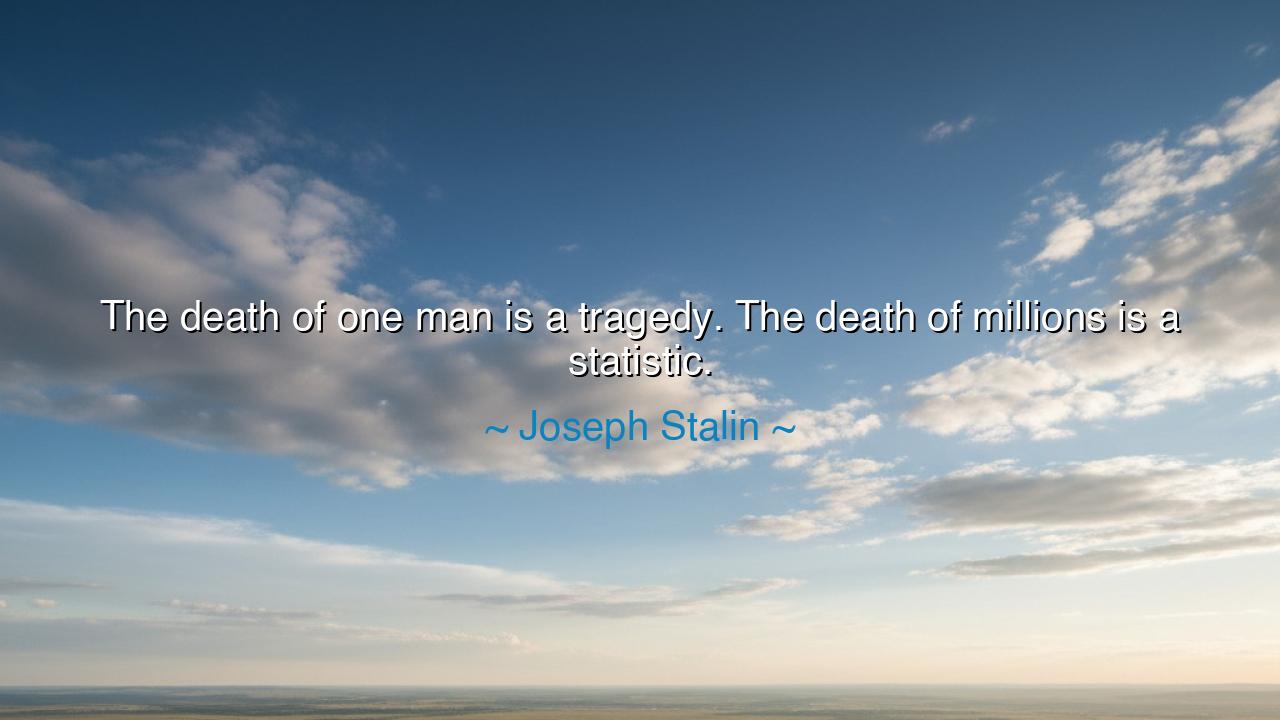
The death of one man is a tragedy. The death of millions is a






“The death of one man is a tragedy. The death of millions is a statistic.” So spoke Joseph Stalin, the iron ruler of the Soviet Union, a man whose words carried the chill of history’s darkest wisdom. Beneath this brutal statement lies a truth both horrifying and profound—the revelation of how easily the human heart grows numb before the vastness of suffering. The quote, often attributed to him during the years of his rule, was not merely the observation of a cynic, but the confession of one who understood the machinery of power and perception. It exposes the grim paradox of the human condition: that compassion, so vivid when we behold the pain of one soul, fades when multiplied across the masses.
The origin of this thought rests in the crucible of the twentieth century, an age of ideology and blood. Stalin presided over a nation that saw famine, purges, and war consume millions of lives. To govern such horror, one could not afford the burden of empathy. To feel for each death would be to drown beneath the weight of grief. And so, the tyrant speaks with chilling detachment, revealing the terrible arithmetic of power: a single tragedy can move nations to tears, but the suffering of multitudes becomes abstraction—a number, a record, a line in a report. This is not merely Stalin’s crime, but humanity’s frailty. For it is easier to count the dead than to mourn them.
Throughout history, this truth has revealed itself again and again. Consider the tale of a single soldier lost in war. When his mother weeps, his name is remembered; his story burns in the hearts of those who loved him. Yet when ten thousand fall, we speak of “casualties,” of “losses,” of “statistics.” The words grow cold, the heart withdraws. During the Great War, millions of men perished in the trenches, and yet poets like Wilfred Owen and Siegfried Sassoon had to remind the world that behind each helmet and uniform lay a life—unique, precious, irreplaceable. Thus, even the victors must bear the guilt of abstraction, for to survive amidst endless death, they must cease to feel its full weight.
The ancients understood this danger. When Pericles stood before the people of Athens to mourn the fallen, he did not speak in numbers; he spoke of souls. He named their courage, their sacrifice, their love for the city. For he knew that if the dead became mere tallies, then the living would lose the meaning of their struggle. The Roman historian Tacitus warned that “great crimes begin as numbers and end as ruins.” Stalin’s quote, though steeped in cruelty, therefore serves as a dark mirror of wisdom—it reminds us that when our compassion fails to keep pace with the scale of suffering, we risk surrendering our humanity altogether.
But the quote carries not only warning; it demands reflection. Why does one life touch us so deeply while millions pass unheeded? It is because empathy is born from proximity—from the gaze, the voice, the story. To feel is to know the person, not the number. When we see a photograph of a single child amid the wreckage of war, our hearts are pierced. Yet when told that tens of thousands of such children perish, we retreat into numbness. This is the flaw of the human heart—it can hold love, but not infinity. And yet, wisdom calls us to fight against this weakness, to expand our compassion beyond the circle of the familiar, to see in the multitude the reflection of one.
One can find redemption for this truth in the story of Oskar Schindler, the German industrialist who, during the Holocaust, saved over a thousand Jewish lives. When faced with the enormity of genocide, he did not despair at the millions he could not save. Instead, he chose to act where he could—to turn the statistic into names, faces, and stories. “He who saves one life,” says the ancient Talmud, “saves the world entire.” In this, Schindler and others like him proved that even amidst the dehumanizing tide of history, one act of compassion can restore meaning to countless lives.
Thus, the words of Joseph Stalin stand as both a condemnation and a challenge. They reveal the ease with which power—and even ordinary people—can lose sight of the sacred worth of the individual. Yet they also remind us of our duty: to resist the transformation of tragedy into indifference. In a world where headlines speak of millions displaced, millions starving, millions lost, we must strive to remember that behind every “million” stands a single soul, with dreams, fears, and love.
So, my friends, learn from this dark saying. Do not let numbers dull your heart. When you hear of suffering, seek out the face within the crowd, the single voice crying out amidst the multitude. Speak their names, honor their stories, and carry their memory. For the death of one man is indeed a tragedy—but only if we remember that the death of millions is not a statistic, but a multitude of tragedies. And if we can keep that truth alive within us, then even in an age of numbers, our hearts will remain human.






AAdministratorAdministrator
Welcome, honored guests. Please leave a comment, we will respond soon